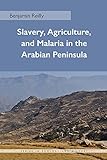Slavery, agriculture, and malaria in the Arabian Peninsula / Benjamin Reilly.
Material type: TextSeries: Ohio University Press series in ecology and historyPublisher: Athens : Ohio University Press, [2015]Copyright date: �2015Description: 1 online resource (165 pages) : illustrationsContent type:
TextSeries: Ohio University Press series in ecology and historyPublisher: Athens : Ohio University Press, [2015]Copyright date: �2015Description: 1 online resource (165 pages) : illustrationsContent type: - text
- computer
- online resource
- 9780821445402 (e-book)
- Slavery -- Arabian Peninsula -- History
- Africans -- Arabian Peninsula -- History
- Slaves -- Arabian Peninsula -- History
- Agricultural laborers -- Arabian Peninsula -- History
- Malaria -- Social aspects -- Arabian Peninsula -- History
- Agriculture -- Health aspects -- Arabian Peninsula -- History
- Agriculture -- Social aspects -- Arabian Peninsula -- History
- Agriculture -- Environmental aspects -- Arabian Peninsula -- History
- Oases -- Arabian Peninsula -- History
- Arabian Peninsula -- Environmental conditions -- History
- 306.3/620953 23
- HT1316 .R45 2015
Includes bibliographical references and index.
"In Slavery, Agriculture, and Malaria in the Arabian Peninsula, Benjamin Reilly illuminates a previously unstudied phenomenon: the large-scale employment of people of African ancestry as slaves in agricultural oases within the Arabian Peninsula. The key to understanding this unusual system, Reilly argues, is the prevalence of malaria within Arabian Peninsula oases and drainage basins, which rendered agricultural lands in Arabia extremely unhealthy for people without genetic or acquired resistance to malarial fevers. In this way, Arabian slave agriculture had unexpected similarities to slavery as practiced in the Caribbean and Brazil. This book synthesizes for the first time a body of historical and ethnographic data about slave-based agriculture in the Arabian Peninsula. Reilly uses an innovative methodology to analyze the limited historical record and a multidisciplinary approach to complicate our understandings of the nature of work in an area that is popularly thought of solely as desert. This work makes significant contributions both to the global literature on slavery and to the environmental history of the Middle East--an area that has thus far received little attention from scholars"-- Provided by publisher.
Description based on print version record.
Electronic reproduction. Ann Arbor, MI : ProQuest, 2015. Available via World Wide Web. Access may be limited to ProQuest affiliated libraries.
There are no comments on this title.

